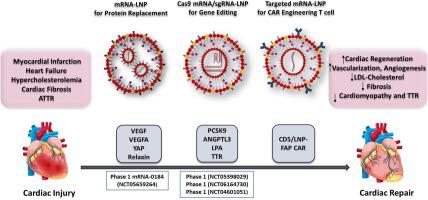当前位置:
X-MOL 学术
›
J. Control. Release
›
论文详情
Our official English website, www.x-mol.net, welcomes your feedback! (Note: you will need to create a separate account there.)
Lipid nanoparticle (LNP) mediated mRNA delivery in cardiovascular diseases: Advances in genome editing and CAR T cell therapy
Journal of Controlled Release ( IF 10.5 ) Pub Date : 2024-06-15 , DOI: 10.1016/j.jconrel.2024.06.023 Setareh Soroudi 1 , Mahmoud Reza Jaafari 2 , Leila Arabi 3
Journal of Controlled Release ( IF 10.5 ) Pub Date : 2024-06-15 , DOI: 10.1016/j.jconrel.2024.06.023 Setareh Soroudi 1 , Mahmoud Reza Jaafari 2 , Leila Arabi 3
Affiliation

|
Cardiovascular diseases (CVDs) are the leading cause of global mortality among non-communicable diseases. Current cardiac regeneration treatments have limitations and may lead to adverse reactions. Hence, innovative technologies are needed to address these shortcomings. Messenger RNA (mRNA) emerges as a promising therapeutic agent due to its versatility in encoding therapeutic proteins and targeting “undruggable” conditions. It offers low toxicity, high transfection efficiency, and controlled protein production without genome insertion or mutagenesis risk. However, mRNA faces challenges such as immunogenicity, instability, and difficulty in cellular entry and endosomal escape, hindering its clinical application. To overcome these hurdles, lipid nanoparticles (LNPs), notably used in COVID-19 vaccines, have a great potential to deliver mRNA therapeutics for CVDs. This review highlights recent progress in mRNA-LNP therapies for CVDs, including Myocardial Infarction (MI), Heart Failure (HF), and hypercholesterolemia. In addition, LNP-mediated mRNA delivery for CAR T-cell therapy and CRISPR/Cas genome editing in CVDs and the related clinical trials are explored. To enhance the efficiency, safety, and clinical translation of mRNA-LNPs, advanced technologies like artificial intelligence (AGILE platform) in RNA structure design, and optimization of LNP formulation could be integrated. We conclude that the strategies to facilitate the extra-hepatic delivery and targeted organ tropism of mRNA-LNPs (SORT, ASSET, SMRT, and barcoded LNPs) hold great prospects to accelerate the development and translation of mRNA-LNPs in CVD treatment.
中文翻译:

脂质纳米颗粒 (LNP) 介导的心血管疾病中的 mRNA 传递:基因组编辑和 CAR T 细胞治疗的进展
心血管疾病(CVD)是非传染性疾病中全球死亡的主要原因。目前的心脏再生治疗有局限性并且可能导致不良反应。因此,需要创新技术来解决这些缺点。信使 RNA (mRNA) 因其在编码治疗蛋白和针对“不可成药”病症方面的多功能性而成为一种有前途的治疗剂。它具有低毒性、高转染效率和受控蛋白质生产,无基因组插入或诱变风险。然而,mRNA面临着免疫原性、不稳定、难以进入细胞和内体逃逸等挑战,阻碍了其临床应用。为了克服这些障碍,脂质纳米粒子 (LNP)(特别是用于 COVID-19 疫苗)在为 CVD 提供 mRNA 治疗方面具有巨大潜力。这篇综述重点介绍了 mRNA-LNP 治疗 CVD 的最新进展,包括心肌梗死 (MI)、心力衰竭 (HF) 和高胆固醇血症。此外,还探索了用于CAR T细胞治疗的LNP介导的mRNA递送和CVD中的CRISPR/Cas基因组编辑以及相关的临床试验。为了提高mRNA-LNP的效率、安全性和临床转化,可以整合RNA结构设计中的人工智能(AGILE平台)和LNP配方优化等先进技术。我们的结论是,促进 mRNA-LNP(SORT、ASSET、SMRT 和条形码 LNP)肝外递送和靶向器官向性的策略对于加速 mRNA-LNP 在 CVD 治疗中的开发和翻译具有广阔的前景。
更新日期:2024-06-15
中文翻译:

脂质纳米颗粒 (LNP) 介导的心血管疾病中的 mRNA 传递:基因组编辑和 CAR T 细胞治疗的进展
心血管疾病(CVD)是非传染性疾病中全球死亡的主要原因。目前的心脏再生治疗有局限性并且可能导致不良反应。因此,需要创新技术来解决这些缺点。信使 RNA (mRNA) 因其在编码治疗蛋白和针对“不可成药”病症方面的多功能性而成为一种有前途的治疗剂。它具有低毒性、高转染效率和受控蛋白质生产,无基因组插入或诱变风险。然而,mRNA面临着免疫原性、不稳定、难以进入细胞和内体逃逸等挑战,阻碍了其临床应用。为了克服这些障碍,脂质纳米粒子 (LNP)(特别是用于 COVID-19 疫苗)在为 CVD 提供 mRNA 治疗方面具有巨大潜力。这篇综述重点介绍了 mRNA-LNP 治疗 CVD 的最新进展,包括心肌梗死 (MI)、心力衰竭 (HF) 和高胆固醇血症。此外,还探索了用于CAR T细胞治疗的LNP介导的mRNA递送和CVD中的CRISPR/Cas基因组编辑以及相关的临床试验。为了提高mRNA-LNP的效率、安全性和临床转化,可以整合RNA结构设计中的人工智能(AGILE平台)和LNP配方优化等先进技术。我们的结论是,促进 mRNA-LNP(SORT、ASSET、SMRT 和条形码 LNP)肝外递送和靶向器官向性的策略对于加速 mRNA-LNP 在 CVD 治疗中的开发和翻译具有广阔的前景。
















































 京公网安备 11010802027423号
京公网安备 11010802027423号